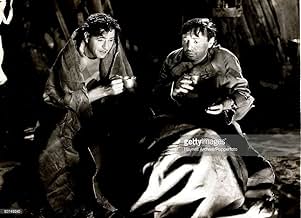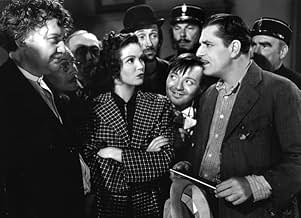After saving a tramp from suicide, a millionaire takes his clothing and disappears. Word is out that he will give a million francs to anyone who is kind to a tramp.After saving a tramp from suicide, a millionaire takes his clothing and disappears. Word is out that he will give a million francs to anyone who is kind to a tramp.After saving a tramp from suicide, a millionaire takes his clothing and disappears. Word is out that he will give a million francs to anyone who is kind to a tramp.
Featured reviews
For some strange Hollywood reason, the lovely, talented, adorable Marjorie Weaver had only about 45 credits -- despite the fact she stole this movie and many if not most of the others she played in.
Watching her here, in "I'll Give a Million," one has to be just grabbed by her gorgeous eyes, first, then by her bubbly personality, and I was really taken by her speech: She is a native of Tennessee, retaining the charm of the Southern belle.
Warner Baxter is the nominal star and here he gives one of his best casual performances. He plays the put-upon millionaire quite believably.
Peter Lorre gives a very different portrayal for him and is charming and likable, proving that he had an extraordinary range as an actor.
Jean Hersholt is mostly hidden by his role, as is John Carradine, as a rather flamboyant tramp.
Several exotic players give performances ranging from understated to over the top, but overall are quite watchable and enjoyable.
"I'll Give a Million" is fun, with settings ranging from a millionaire's yacht to a circus to the police station. I recommend it, and there is a quite good print at YouTube.
Watching her here, in "I'll Give a Million," one has to be just grabbed by her gorgeous eyes, first, then by her bubbly personality, and I was really taken by her speech: She is a native of Tennessee, retaining the charm of the Southern belle.
Warner Baxter is the nominal star and here he gives one of his best casual performances. He plays the put-upon millionaire quite believably.
Peter Lorre gives a very different portrayal for him and is charming and likable, proving that he had an extraordinary range as an actor.
Jean Hersholt is mostly hidden by his role, as is John Carradine, as a rather flamboyant tramp.
Several exotic players give performances ranging from understated to over the top, but overall are quite watchable and enjoyable.
"I'll Give a Million" is fun, with settings ranging from a millionaire's yacht to a circus to the police station. I recommend it, and there is a quite good print at YouTube.
"I'll Give a Million" is silly escapist film. It's based on a 1935 Italian film and is, inexplicably, set in France. When the film begins, Tony (Warner Baxter) is aboard his huge yacht. However, despite his wealth, he doesn't particularly love his life...and this is apparent when he jumps overboard to save a drowning hobo, Louis (Peter Lorre). The folks aboard the boat don't realize he's jumped and Tony swims ashore with his new friend. But as I said, he didn't love his life and instead of going to the nearest authorities to tell them who he is, he dons Louis' clothes and decides to be a hobo!
In the meantime, Louis comes into town in a tux and a wad of cash and is a sensation. He informs everyone it's from his millionaire benefactor and the same man had told him he was tired of phonies and would give 1,000,000 francs if someone just did something nice for him without expectation that they'd ever get paid back. After telling the press this story, it makes the newspaper and suddenly everyone in town is being super-nice to all the hobos! In the meantime, Tony has met a lovely woman, Jean (Marjorie Weaver) and she's taken him under her wing at the circus. What's next? See the film.
I sure would love to find a copy of the original Italian film because the American version is very enjoyable and I'd love to see how good the first version is. Regardless, nice acting and a cute story make this one worth your time.
In the meantime, Louis comes into town in a tux and a wad of cash and is a sensation. He informs everyone it's from his millionaire benefactor and the same man had told him he was tired of phonies and would give 1,000,000 francs if someone just did something nice for him without expectation that they'd ever get paid back. After telling the press this story, it makes the newspaper and suddenly everyone in town is being super-nice to all the hobos! In the meantime, Tony has met a lovely woman, Jean (Marjorie Weaver) and she's taken him under her wing at the circus. What's next? See the film.
I sure would love to find a copy of the original Italian film because the American version is very enjoyable and I'd love to see how good the first version is. Regardless, nice acting and a cute story make this one worth your time.
This film starts out with great promise. Tony (Warner Baxter) is a wealthy man, out on his yacht, who suddenly becomes aware that everybody onboard is just nice to him because of his money. As he stands leaning over the railing of the yacht, pondering this fact, he notices a man yelling for help, apparently drowning in the ocean. His yells of man overboard are not heard, so he jumps in and rescues the man. The yacht is out of range, so he swims to shore with Louis (Peter Lorre) in tow.
They camp on the beach for the night, and Tony tells Louis that if he could find just one person who was nice to him and not expecting a payout that he would give that person one million francs (today one dollar = 5 francs). The next day Louis awakens and finds Tony gone but his clothes and money still there. He goes into town wearing Tony's clothes and spending Tony's money. This gets the attention of the police, where Louis tells the story of the rich man, incognito dressed like a tramp, who will give one million francs to anybody who does a good deed for him with no expectations of reward. Soon everybody is being nice to all of the hobos. Meanwhile, Tony has become friends with a woman in a circus who knows nothing about this . Complications ensue.
Now all of this sounds pretty good, but it just seems to bog down a bit after Tony and Louie separate. A 1930s Fox screwball comedy is a rarity, and there is a reason for that. This would have been even better and probably ringed a bit truer if it had been made over at Warner Brothers, retaining the natural performance of Baxter as the millionaire and Lorre as the impish tramp and maybe using some of Warners' great contract players to fill in the blanks.
Still, it is funny and like "My Man Godfrey" has something to say about how your pocketbook often dictates your treatment by your fellow man towards the end of the Great Depression. A rare message-comedy from Fox.
They camp on the beach for the night, and Tony tells Louis that if he could find just one person who was nice to him and not expecting a payout that he would give that person one million francs (today one dollar = 5 francs). The next day Louis awakens and finds Tony gone but his clothes and money still there. He goes into town wearing Tony's clothes and spending Tony's money. This gets the attention of the police, where Louis tells the story of the rich man, incognito dressed like a tramp, who will give one million francs to anybody who does a good deed for him with no expectations of reward. Soon everybody is being nice to all of the hobos. Meanwhile, Tony has become friends with a woman in a circus who knows nothing about this . Complications ensue.
Now all of this sounds pretty good, but it just seems to bog down a bit after Tony and Louie separate. A 1930s Fox screwball comedy is a rarity, and there is a reason for that. This would have been even better and probably ringed a bit truer if it had been made over at Warner Brothers, retaining the natural performance of Baxter as the millionaire and Lorre as the impish tramp and maybe using some of Warners' great contract players to fill in the blanks.
Still, it is funny and like "My Man Godfrey" has something to say about how your pocketbook often dictates your treatment by your fellow man towards the end of the Great Depression. A rare message-comedy from Fox.
In the heart of the Depression, moviegoers needed screwball comedies to cheer themselves up for a quarter. In that vein, they were heartily treated to some of the best comedy of all time from Laurel and Hardy to Frank Capra. This film is tn that tradition. Similar to Mr. Deeds Goes to Town and Sullivan's Travels in the sense that a powerful person is living as a common man among the masses of the poor, the film has a certain charm that is no longer found in films after the Golden Age of Hollywood. Fortunately, we have Youtube to access some of these gems from the past. Lots of fun.
This Fox B remake of a a farce starring De Sica is nicely directed by Walter Lang with a sprawling supporting cast that the big studios' B departments could use when given the chance.
The story has millionaire Warner Baxter dive off his yacht to rescue suicidal Peter Lorre, then head off to deal with the real world instead of the parasites on board. Lorre spreads the word that a millionaire is wandering around in tramp clothes, and will give a million francs to anyone who is kind to him without any pecuniary interest. With a cast of dozens of character actors, this is an example of why I consider Fox' B movies in this period the best....and often better than most studios' As.
The story has millionaire Warner Baxter dive off his yacht to rescue suicidal Peter Lorre, then head off to deal with the real world instead of the parasites on board. Lorre spreads the word that a millionaire is wandering around in tramp clothes, and will give a million francs to anyone who is kind to him without any pecuniary interest. With a cast of dozens of character actors, this is an example of why I consider Fox' B movies in this period the best....and often better than most studios' As.
Did you know
- Trivia"I'll Give a Million" was based on a 1936 film of the same name with Vittorio De Sica, whom Fox unsuccessfully tried to recruit for this remake.
- GoofsWarner Baxter was 5'11", Peter Lorre was 5'3", yet there exchanged clothing fit each other perfectly.
- ConnectionsRemake of Je donnerai un million (1935)
Details
- Runtime
- 1h 10m(70 min)
- Color
- Aspect ratio
- 1.37 : 1
Contribute to this page
Suggest an edit or add missing content



























